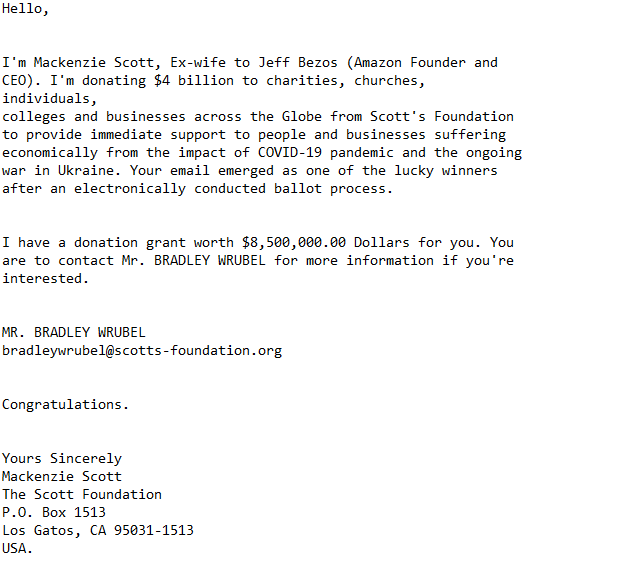The “Donation Grant For You” email is a scam email that claims you have been chosen to receive $8.5 million. The sender of the email introduces themselves as Mackenzie Scott, the ex-wife of Jeff Bezos. Mackenzie Scott has donated several billions of dollars to various charities over the years so scammers are using this to scam users. This email is nothing more than a scam. If users receive this email, they can just delete it from their inbox.
These emails promise users a lot of money for no apparent reason, usually because they won, inherited, have been selected in a giveaway, etc. The scams are a modern version of the Spanish Prisoner scam that was common in the late 18th century. Those scams involved scammers contacting people and asking for help to smuggle a wealthy individual from a prison in Spain. In exchange for money to bribe guards, potential victims were promised a lot of money. Nowadays, these scams work in a similar fashion. Scammers promise millions of dollars but users first need to send money. Scammers come up with various reasons why users would need to send money. However, the reasons usually make very little sense.
This particular email claims that Mackenzie Scott is planning on donating $4 billion to various charities, charities, churches, individuals, colleges, businesses, etc. Mackenzie Scott is known for having donated several billion dollars to charities after her divorce from Amazon founder Jeff Bezos. Scammers are using this information to their advantage.
This email claims that the recipient will receive $8.5 million but does not mention a lot of information. Interested users are requested to contact someone called Bradley Wrubel via bradleywrubel@scotts-foundation.org.
Below is the full “Donation Grant For You” spam email:
Subject: CONGRATULATIONS…
Hello,
I’m Mackenzie Scott, Ex-wife to Jeff Bezos (Amazon Founder and
CEO). I’m donating $4 billion to charities, churches,
individuals,
colleges and businesses across the Globe from Scott’s Foundation
to provide immediate support to people and businesses suffering
economically from the impact of COVID-19 pandemic and the ongoing
war in Ukraine. Your email emerged as one of the lucky winners
after an electronically conducted ballot process.I have a donation grant worth $8,500,000.00 Dollars for you. You
are to contact Mr. BRADLEY WRUBEL for more information if you’re
interested.MR. BRADLEY WRUBEL
bradleywrubel@scotts-foundation.orgCongratulations.
Yours Sincerely
Mackenzie Scott
The Scott Foundation
P.O. Box 1513
Los Gatos, CA 95031-1513
USA.
If users engage with the scammers, they will eventually be asked to provide their personal information. Scammers may try to phish information via several emails, first asking for general information like full name, phone number, and home address, and later move on to request more sensitive information. Scammers will also try to establish trust with the potential victims to make it easier to scam them.
Successfully phished personal information is often sold on hacker forums. Personal information is very sought-after by malicious actors because it allows them to perform sophisticated and targeted attacks. Users are much more likely to respond positively when they are contacted by someone who knows their name and other information so there is a higher chance of success.
While personal information is a hot commodity among malicious emails, the main objective of these scam emails is money. Initially, the emails do not mention this but users who engage will eventually be asked to send some amount of money. Scammers will come up with all kinds of reasons why they may need money. For example, they may claim that some kind of problem has arisen, and money is necessary to fix it. The reasons will likely make very little sense but if trust has already been established with the recipient, they’re more likely to not think twice about the reason.
Emails that promise money are always scams. Users don’t even need to pay close attention to the email to determine that it’s a scam because the contents are completely ridiculous. However, at least this email tries to appear credible by using the name of a legitimate person who is known to donate large amounts of money to charity.
These types of email scam emails have been around for decades, and it’s difficult to imagine that users still fall for them. However, these scam campaigns are very low-effort and do not require a lot of resources so some malicious groups may be running them in the background while doing other malicious activities. It may be worth operating them for the occasional person who falls for them.
If users have engaged with cyber criminals and sent their personal information, they need to be very careful with unsolicited contact (emails, phone calls, etc.) in the future. Unfortunately, if users have transferred money, it will not be possible to get it back. If users have provided their payment card information, they need to immediately contact their banks to cancel the cards.
Site Disclaimer
2-remove-virus.com is not sponsored, owned, affiliated, or linked to malware developers or distributors that are referenced in this article. The article does not promote or endorse any type of malware. We aim at providing useful information that will help computer users to detect and eliminate the unwanted malicious programs from their computers. This can be done manually by following the instructions presented in the article or automatically by implementing the suggested anti-malware tools.
The article is only meant to be used for educational purposes. If you follow the instructions given in the article, you agree to be contracted by the disclaimer. We do not guarantee that the artcile will present you with a solution that removes the malign threats completely. Malware changes constantly, which is why, in some cases, it may be difficult to clean the computer fully by using only the manual removal instructions.
